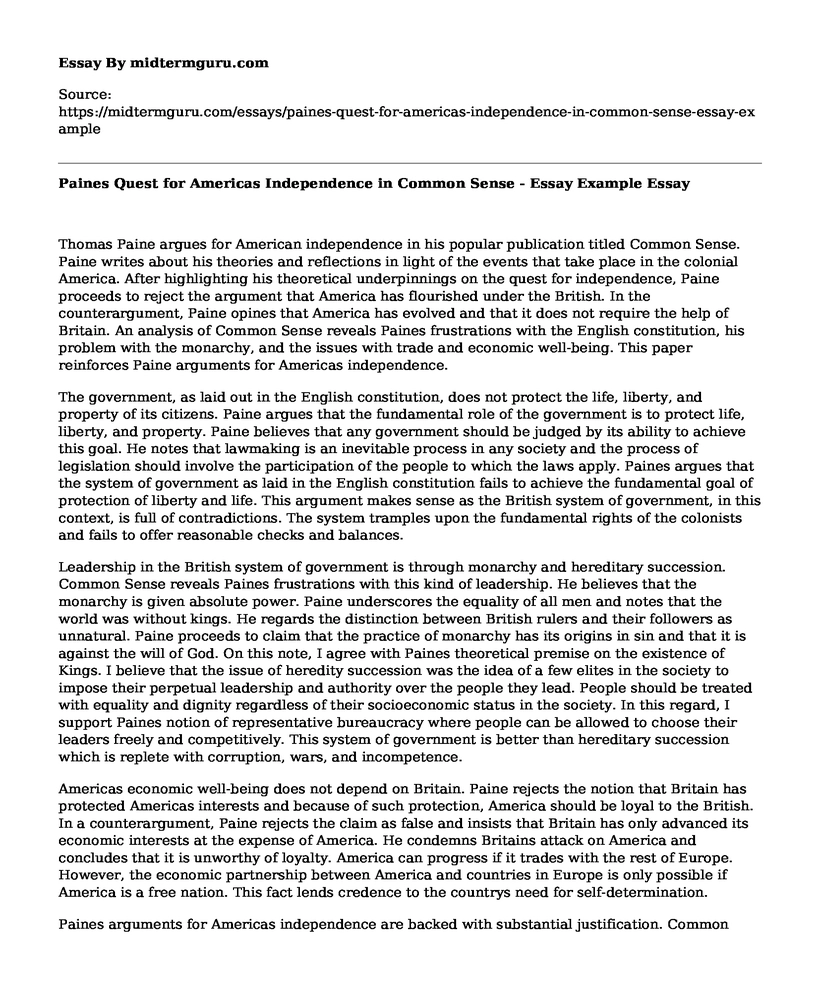Thomas Paine argues for American independence in his popular publication titled Common Sense. Paine writes about his theories and reflections in light of the events that take place in the colonial America. After highlighting his theoretical underpinnings on the quest for independence, Paine proceeds to reject the argument that America has flourished under the British. In the counterargument, Paine opines that America has evolved and that it does not require the help of Britain. An analysis of Common Sense reveals Paines frustrations with the English constitution, his problem with the monarchy, and the issues with trade and economic well-being. This paper reinforces Paine arguments for Americas independence.
The government, as laid out in the English constitution, does not protect the life, liberty, and property of its citizens. Paine argues that the fundamental role of the government is to protect life, liberty, and property. Paine believes that any government should be judged by its ability to achieve this goal. He notes that lawmaking is an inevitable process in any society and the process of legislation should involve the participation of the people to which the laws apply. Paines argues that the system of government as laid in the English constitution fails to achieve the fundamental goal of protection of liberty and life. This argument makes sense as the British system of government, in this context, is full of contradictions. The system tramples upon the fundamental rights of the colonists and fails to offer reasonable checks and balances.
Leadership in the British system of government is through monarchy and hereditary succession. Common Sense reveals Paines frustrations with this kind of leadership. He believes that the monarchy is given absolute power. Paine underscores the equality of all men and notes that the world was without kings. He regards the distinction between British rulers and their followers as unnatural. Paine proceeds to claim that the practice of monarchy has its origins in sin and that it is against the will of God. On this note, I agree with Paines theoretical premise on the existence of Kings. I believe that the issue of heredity succession was the idea of a few elites in the society to impose their perpetual leadership and authority over the people they lead. People should be treated with equality and dignity regardless of their socioeconomic status in the society. In this regard, I support Paines notion of representative bureaucracy where people can be allowed to choose their leaders freely and competitively. This system of government is better than hereditary succession which is replete with corruption, wars, and incompetence.
Americas economic well-being does not depend on Britain. Paine rejects the notion that Britain has protected Americas interests and because of such protection, America should be loyal to the British. In a counterargument, Paine rejects the claim as false and insists that Britain has only advanced its economic interests at the expense of America. He condemns Britains attack on America and concludes that it is unworthy of loyalty. America can progress if it trades with the rest of Europe. However, the economic partnership between America and countries in Europe is only possible if America is a free nation. This fact lends credence to the countrys need for self-determination.
Paines arguments for Americas independence are backed with substantial justification. Common Sense highlights Paines problems with America under the British due to its limited power to shape its destiny. In Paines envisioned America, the citizens would not be ruled by a monarchy, and the people will have an opportunity to elect their leaders. In the New America, the government would not abdicate its fundamental goal of protecting life and liberty. Finally, a liberated America would advance its economic interests freely.
Cite this page
Paines Quest for Americas Independence in Common Sense - Essay Example. (2021, Jun 07). Retrieved from https://midtermguru.com/essays/paines-quest-for-americas-independence-in-common-sense-essay-example
If you are the original author of this essay and no longer wish to have it published on the midtermguru.com website, please click below to request its removal:
- Personal Insights Regarding Julia Alvarez and Harlem Renaissance Poets
- Essay Sample on the Wonders of the Ancient World
- History Essay Sample About Alexander the Great
- Research Paper on Background and Identity of Saint Padre Pio
- Essay Sample on US Invasion of Iraq in 2003
- Book Analysis Essay on Harriet Tubman: The Road to Freedom
- The Corwin Amendment: Impact of the American Civil War - Essay Sample







